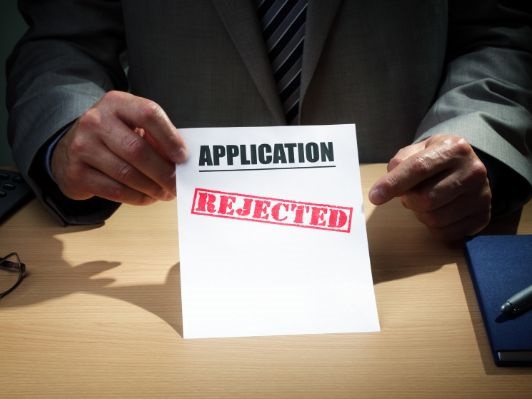Are you frustrated because you need a loan but keep getting rejected? It’s normal to feel upset when this happens. Let’s look at the most common reasons why this might be happening, especially if you are in financial difficulty, and what you can do about it.
1. Low Credit Score
Your credit score shows lenders how well you handle money. When you apply for a loan, lenders check this score. If you have failed to make payments or have other credit problems in the past, your poor credit score might be low. These issues can stay on your record for up to six years.
What to do: Check your credit score before you apply for loans. If it’s low, work on improving it first to improve your credit score effectively. Pay down existing loans and make all payments on time.
2. Unstable Finances
Lenders need to know you can pay back the loan. They look at your whole financial situation, not just your credit score, during the credit check process . If they see signs that you’re having money troubles, they probably won’t approve your loan.
What to do: Apply when your finances are in good shape to increase your chances of a successful loan application. Keep up with your monthly repayments on other loans and try not to max out your credit cards.
3. Too Much Debt Compared to Income
Lenders look at how much of your monthly income goes to debt payments. For example, if you earn £1,200 per month but already pay £800 toward debt repayments with missed repayments, that’s a red flag.
What to do: Try to keep your total debt payments below 40% of your income. Pay down some debts, as affordability checks will consider this, before applying for new loans.
4. Mistakes in Your Information
Your name and address must match what’s in your credit file. Lenders have to verify who you are through strict checks. Any differences can cause problems.
What to do: Make sure you’re on the electoral roll at your current address. Check that all details in your credit file, including those on your application form, are correct.
5. Links to Someone with Bad Credit
If you’ve shared finances with someone who has poor credit (like joint accounts or loans), this can affect your applications even when you apply alone, especially if they have a bad credit history.
What to do: If the relationship has ended, ask credit reference agencies to remove these financial links from your file. Make sure your are no longer connected financially. This should improve your credit score.
Understanding Your Credit Report
What is in Your Credit File?
Your file contains:
- Your borrowing history
- Current and past loans
- Payment records
- Personal details
- Whether you’re on the electoral roll
Credit Reference Agencies
The UK has three main credit agencies: Experian, Equifax, and TransUnion. Each may have slightly different information about your credit history, so your credit score might vary between them.
These agencies collect information from banks, building societies, and other lenders. They put this information into a credit report that lenders can see when you apply for credit.
Monitoring Your Score
Check your credit score regularly to track improvements and spot problems. Many services offer free access to your credit report. It’s especially important to check if you have a poor credit score, low credit score, or even bad credit issues.
By watching your credit file, you can also catch any fraud early and fix it before it hurts your chances of getting credit.
How Loan Applications Affect Your Score
Hard Credit Checks
When you apply for a loan, lenders do a “hard credit check.” This leaves a mark on your credit file during the application process. Too many of these checks in a short time can hurt your score.
Multiple credit applications made close together can make you look desperate for money. This worries potential lenders. Each application and hard check can temporarily lower your score.
Space Out Your Applications
Don’t apply for multiple loans at once. If one lender says no, wait before trying another. Use eligibility checkers that do “soft searches” first for short term credit – these don’t affect your score.
Options When You Have Poor Credit
Building Your Credit Rating
To improve your score, especially if you have bad credit:
- Make sure all your details are correct and up to date
- Pay bills on time, even if you can only pay the minimum
- Consider small credit products designed to rebuild credit
Alternative Lending Options
Some lenders specialise in helping people with bad credit. Be aware that these often charge higher interest rates to cover their increased risk.
Always make sure you can afford the repayments before taking any form of credit.
Credit Unions vs. Direct Lenders
Credit unions are not-for-profit organisations that may have more flexible lending rules. They often charge lower interest rates than short-term lenders and look at your personal situation, not just your credit score.
Credit unions assess applications based on your circumstances rather than just relying on automatic credit score checks.
Warning Signs of Money Problems
Late or Failed Payments and Their Impact
Even one missed payment can damage your credit rating and stay on your file for up to six years. If you’re struggling to pay, contact your lenders right away.
Many lenders have hardship programs and may be willing to adjust your payment schedule rather than reporting failed payments to credit agencies.
County Court Judgments (CCJs)
CCJs are serious black marks on your credit file. They happen when you don’t repay a debt and the creditor takes legal action. A CCJ stays on your record for six years unless you pay it in full within one month.
If you get a CCJ, try to pay it in full within one month to have it removed from your credit file. Otherwise, it will stay for six years, making it very hard to borrow money.
Steps to Take Before Applying Again
Improving Your Eligibility
Before trying again:
- Check your credit report for errors
- Register on the electoral roll
- Pay down existing debts
- Make sure your income is stable and enough to cover the loan payments
Lenders do thorough checks to make sure you can manage the repayments without putting yourself into money trouble.
Understanding Lender Criteria
Different lenders have different rules for approving loans. Research to find those most likely to accept someone with your financial profile and explore alternative options.
Some lenders specialise in helping those who have been turned down elsewhere, but be aware they may charge higher interest rates to make up for the increased risk.
Does the Type of Loan Product Affect Your Chances?
Short Term Loans
Short term loans are typically for smaller amounts and shorter repayment periods. They may be easier to get than longer-term products, but often come with higher interest rates.
If you’re thinking about a short term loan, make sure you can repay it by your next payday or within the agreed time. Missing payments on these loans can quickly lead to growing debt.
Payday Loans
Payday loans are designed to cover short-term cash needs until your next payday. They often come with very high interest rates compared to other types of loans. The can be a sign that you are in financial difficulty. If you do not manage them carefully they can cause a bad credit rating. Always check that you are applying to a regulated lender.
Key facts about payday loans:
- They usually range from £100 to £1,000
- Repayment is typically due when you get your next wages
- Interest rates can be very high – sometimes over 1,000% APR
- The FCA has set rules to cap the costs of payday loans
- Lenders can’t charge more than 0.8% interest per day
- The total cost cannot be more than twice what you borrowed
- Late payment fees are limited to £15
Things to be careful about:
- Only use payday loans for true emergencies
- Make sure you can pay back the full amount on time
- Having many payday loans can make other lenders refuse you
- Not making payments can quickly lead to serious financial problems
- Some lenders may approve you even with bad credit, but at very high costs
- It could be a sign that you are struggling financially
- Having multiple payday loans can mean you will be refused credit in the future
- Its worth noting, only borrow as much money as you need, never more.
Better options to try first:
- Ask your bank about a small overdraft
- Check if you can get help from your local council
- Look into credit union loans which have lower rates
- Speak to StepChange or Citizens Advice for free debt help
- Consider a budgeting loan from the Social Fund if you get benefits
Many people turn to payday loans when declined for other credit. But taking one can make it harder to get approved for mainstream loans in the future, particularly if you have multiple credit applications over a short space of time. Lenders often see payday loans as a sign of money troubles.
Personal Loans
Personal loans usually offer larger amounts and longer repayment terms. They typically need a better credit score but offer better interest rates. You may be able to borrow money even if you have a poor credit rating. Check the lenders eligibility criteria before completing the loan application form.
When applying for a personal loan, lenders will look at your borrowing history and ability to make steady repayments over a long period.
In Summary
Being turned down for a loan can be disheartening when you think, “I need a loan but keep getting declined.” However, understanding the possible reasons gives you power to take positive action. By fixing these issues before applying, you can improve your chances of being approved.
Remember that lenders have a duty to make sure you can afford to repay what you borrow. Their decision to decline your application may be protecting you from taking on more debt than you can handle.
Research carefully to choose a loan product that fits your situation and make sure you can comfortably meet the repayment obligations. If you continue to have problems, consider getting advice from a free debt advice service before taking on more commitments.
Note: This information is provided to help you understand loan applications. It is not financial advice.



![What is the Average Credit Score in the UK? [By Age, By Area] What is the Average Credit Score in the UK](https://www.drafty.co.uk/blog/wp-content/uploads/2024/04/What-is-the-Average-Credit-Score-in-the-UK-218x150.jpg)
